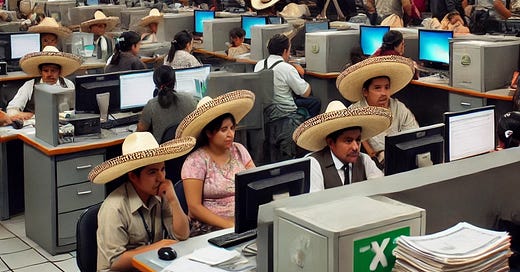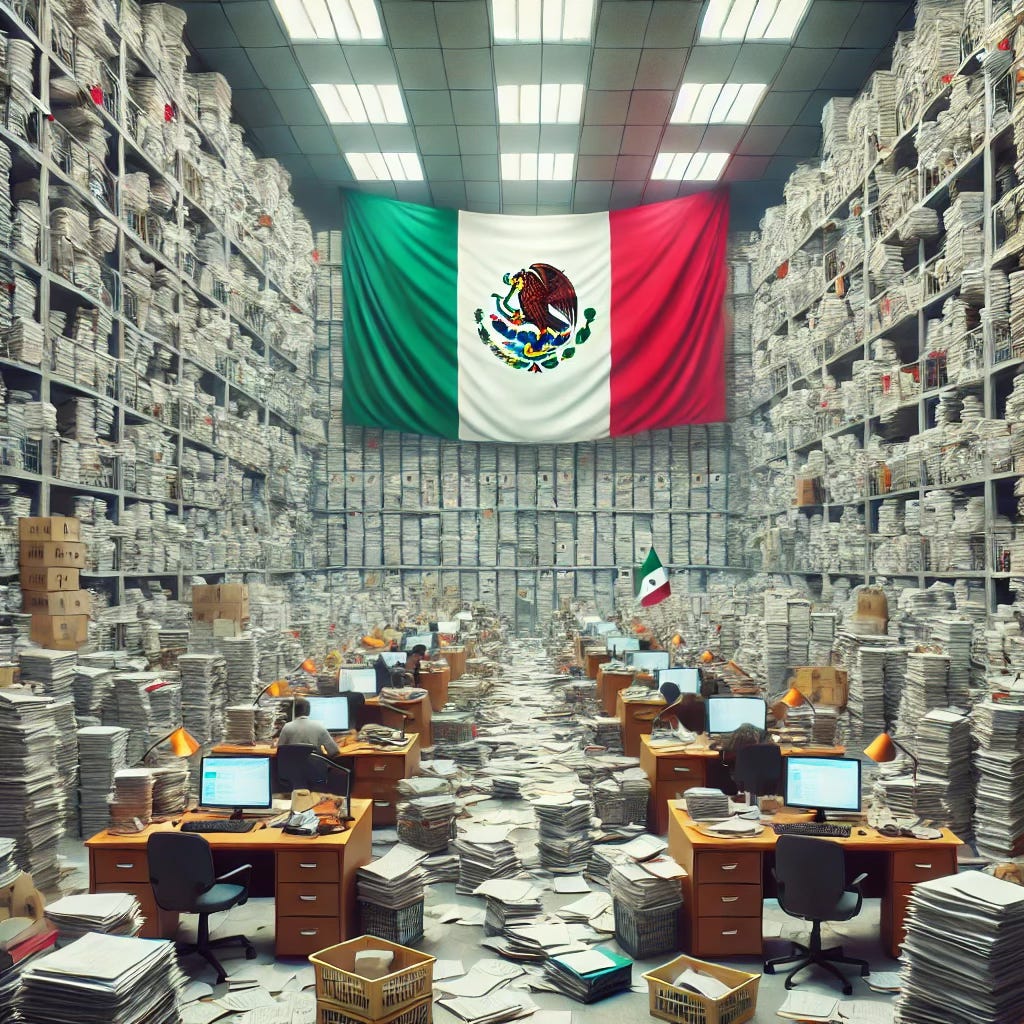No place is perfect, but some places are undoubtedly worse than others. North Korea, for example, must be an incredibly challenging place to live—bagels are even illegal there, for crying out loud.
Now, Mexico, on the other hand, has been quite welcoming to me. In a recent post, I gushed about my deep affection for the Mexican people. But today, I need to vent about Mexican bureaucracy, notably its absurdly convoluted administrative procedures.
The bureaucratic nightmare in Mexico can be traced back to several historical, cultural, and systemic factors. The Spanish colonial administration, with its high level of bureaucracy, left a lasting imprint. Many of those practices are still around today. Some things, as they say, never change. Historically, power has been highly centralized in Mexico, which results in layer upon layer of bureaucracy as orders flow down from the top.
Navigating Mexico's complex legal and institutional framework requires a mountain of paperwork and strict adherence to procedures, fostering a bureaucratic culture. Most Mexicans, rather than being overwhelmed by it, just accept it as part of life.
Bureaucracy can also be a fertile ground for corruption and patronage. Excessive processes create opportunities for bribery and favoritism, perpetuating the system. Has any Mexican president ever left office poorer than when they entered?
In some cases, bureaucracy provides employment for a significant chunk of the population, making it tough to streamline processes and reduce layers of red tape. Cultural norms and values can also play a role, with some seeing bureaucratic processes as essential for maintaining order and legitimacy.
Despite efforts to digitalize and streamline procedures, the integration of technology into government operations can be excruciatingly slow. This technological lag keeps traditional bureaucratic practices alive and well. In many ways, Mexico has remained unchanged for centuries. Tackling these deeply rooted issues requires sweeping reforms and a shift in both administrative practices and cultural perceptions. No one really has the time or patience for that.
Bottom line: this is the way it is. If you're hoping for something different, you might want to book the next flight to North Korea—just make sure to have your fill of deli before you leave.
Several months ago, I embarked on the absurd journey of trying to open a bank account in Mexico. I figured my Charles Schwab account would be my lifeline—free cash withdrawals from ATMs worldwide. A simple local bank fee, 25 pesos for a 10,000 peso withdrawal, roughly $1.36 for $545 in cash. Smooth, right? Wrong.
To pay for utilities and other mundane expenses, I needed a Mexican bank account. I found the bank in Guanajuato with the highest interest rate for a checking account. It seemed straightforward. Deposit five thousand pesos, complete the paperwork, and bam, new account. But no, the signatures on my US passport and Mexican temporary residency card didn’t match. Not even close. They needed to be perfect, I was told. Perfect. No exceptions.
The banker suggested getting a Mexican driver’s license with a matching signature. Meanwhile, my deposit would be held hostage. Off I went to get a driver’s license. Thanks to my Arizona license, I only needed to fill out some forms. No driving test, no written test—just a medical exam.
In Mexico, you can consult with a doctor at a pharmacy for four dollars. . The doctor said I needed an eye exam and proof of my blood type. I read the chart without a hitch, but she said I needed glasses. Blood type proof? Not on hand. I had recent test results with my blood type but no certification.
At the eyeglass store, my limited Spanish hit a wall. The staff's disdain was palpable. No slower speech, no patience for my Google Translate attempts. This hostile encounter led me on a quest for an English-speaking optometrist. Sherrie’s optometrist seemed promising, so I trekked thirty minutes to the center of town on a Saturday morning. Their website posted hours their Saturday hours. But they weren’t open. I waited. And waited. Nothing.
I tried again on a weekday evening. Closed again. I found another eyeglass store nearby. Success, within a week, I had my glasses. Back to the pharmacy doctor, I passed the eye exam. But my blood test results were three months old, and she couldn’t accept them. My blood type wouldn’t change, I argued. Rules were rules. Then I noticed only two months and twenty-nine days had passed. She hadn’t seen that. I got the document.
The Motor Vehicles office was a breeze. In and out in fifteen minutes. With my new license, I returned to the bank. Still, my signature wasn’t perfect. The paperwork went to the main office. They’d let me know within a week. They didn’t. Two weeks later, I returned to the bank to learn that my application was rejected.
Frustration mounted. I demanded my deposit back. It would take a week to ten days. I refused to wait. I threatened to call my attorney. Suddenly, I was the ugly American.
The bank manager returned from lunch. More waiting. He called the main office and started the refund process. More forms, more consistent signatures. Approved! I expected the cash in hand within minutes. Wrong again. I waited another forty-five minutes. My patience was wearing thin.
In Mexico, patience—paciencia—is vital. Without, life here can be a particularly bumpy ride.
Another half-hour and my refund was approved. More forms, more signatures. I finally got a check. But to cash it, he cashier required more forms. I signed them and they went for approval to the branch manager. My signature didn’t match. That’s not the signature we have on file, I was told. So I tried again, meticulously matching them.
The teller confirmed my signatures, but more information and forms were needed as to the exact mount of pesos I would recieve and in what denominations. Another half-hour and the process was complete. Cash in hand, I vowed never to return to that bank. I left with a briefcase full of duplicate forms, saved just in case.
What future bureaucratic nightmares awaited? Only time would tell. But I'd learned my lesson: never underestimate the power of a perfect signature in Mexico.
Next time: my dance with the Mexican judicial system.







Or when your lawyer needs to hang on to your passport for some esoteric procedure but somehow looses it. We used to have a saying, keep a full tank of gas and an empty bladder.
Oh, the stories I could tell you about Ecuadorian bureaucracy. I can't sign my name the exact same way every time either.